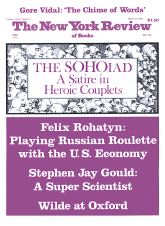In response to:
Life Studies from the February 16, 1984 issue
To the Editors:
Helen Vendler, reviewing Elizabeth Bishop’s Collected Prose [NYR, February 16], states that “Robert Giroux’s two-part division of this collection into ‘Memory: Persons and Places’ and ‘Stories’ belies…the true unity of the prose.” As my introduction makes clear, the two-part division was Elizabeth Bishop’s, not mine. Her notes for the collection had the handwritten heading “In the Village: Stories and Essays (?)” with the question mark indicating her doubts about the word “Essays.” What gave me a more appropriate half-title were the major piece in this section, “Efforts of Affection,” with her subhead “A Memoir of Marianne Moore,” and her words in “Primer Class”: “The real name of this sensation is memory.”
I fail to see how her two-part division belies “the true unity of the prose,” whose only unity is Elizabeth Bishop. Perhaps Helen Vendler defines as stories Elizabeth’s memoir of Miss Moore, her introduction to the Brazilian diary, the accounts of her first job and her visits to Vigia, the village botequim, and the hospital in Key West; I do not. The autobiographical pieces, “Primer Class” and “The Country Mouse,” are certainly memoirs just as “The Sea & Its Shore,” “In Prison” and several others certainly are not. I listed as “Stories” only the prose Elizabeth labelled and published as stories, including “Memories of Uncle Neddy.”
Of course I agree with Helen Vendler’s point that Elizabeth Bishop’s prose is predominantly autobiographical, as her poems are. I also agree that art often obliterates the line between fact and fiction. But it seems insensitive to emphasize that Elizabeth’s prose is not as great as her poetry, when everyone knows what an unusual poet she was. Perhaps the prose does not attain the perfection of her poems, but it is nothing less than superb. Nor am I alone in thinking that the story, “In the Village,” is a masterpiece.
Robert Giroux
New York City
Helen Vendler replies:
There is no real difference between Mr. Giroux and me. He, practicing biographical criticism in his admirable introduction, labels as “stories” pieces Elizabeth Bishop “labelled and published as stories.” I, practicing intrinsic criticism, point out that these “stories” are in fact memoirs rather than pieces with true fictional energy; and I say that Mr. Giroux’s distinction between “memory” and “stories,” in Bishop’s case, does not hold up under critical examination.
To admire Bishop’s prose less than the poetry, and to say so, seems to me only truthful, not “insensitive.” But I would be sorry if my saying so deterred any reader from the gift of the prose bestowed on us by Mr. Giroux.
This Issue
March 29, 1984



